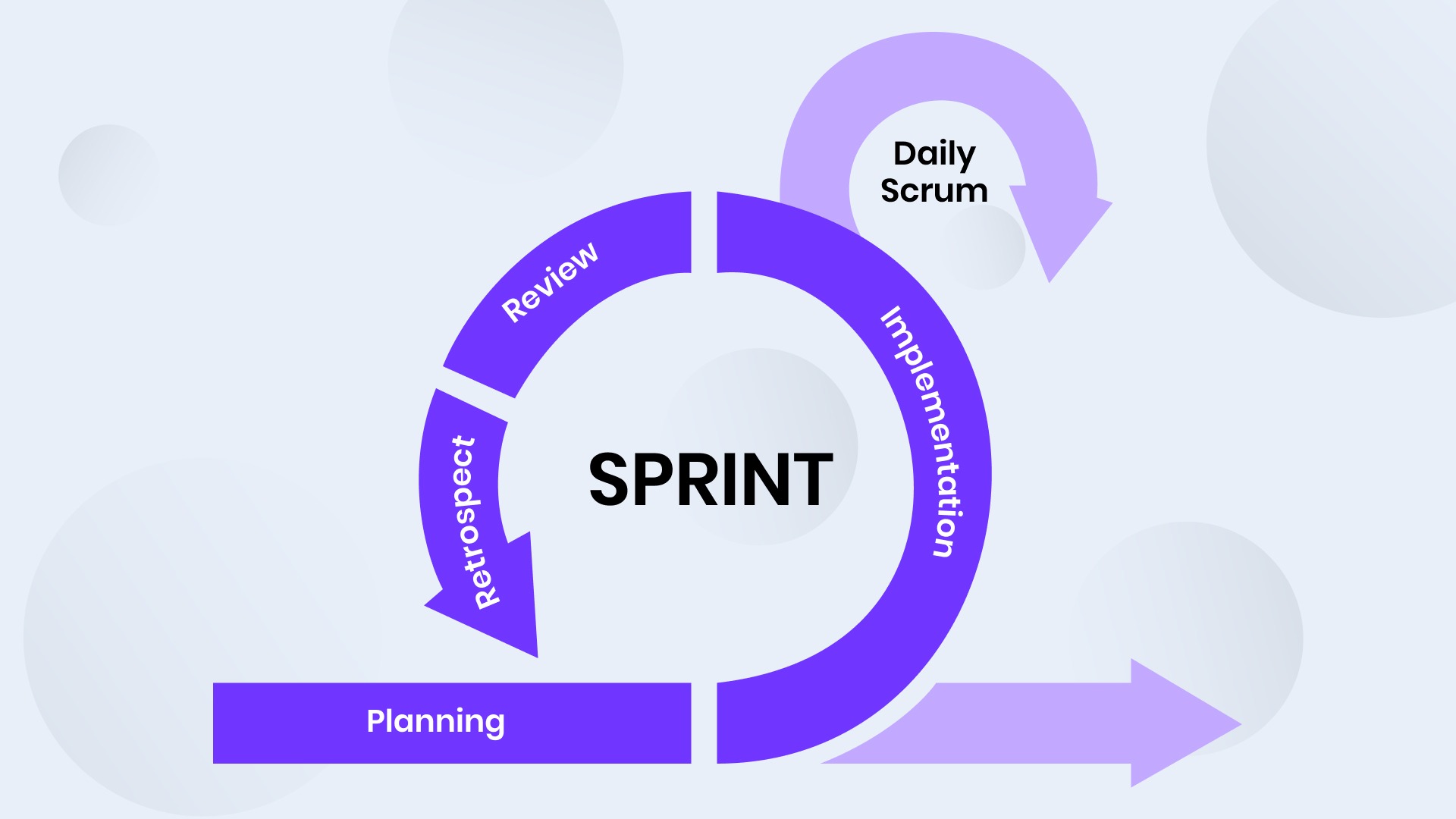
A Scrum Master is a facilitator and coach for a team working within the Scrum framework, a methodology for managing and completing complex projects. They ensure the team adheres to Scrum principles, remove obstacles, and foster an environment that promotes productivity and collaboration. Their primary goal is to help the team deliver high-value results.
Scrum and the new roles it created in the tech sphere
Scrum originated in the 1990s when Jeff Sutherland and Ken Schwaber introduced it as a framework for software development, inspired by concepts from lean manufacturing and agile project management.

First formalized in 1995, Scrum emphasized iterative progress, teamwork, and adaptability. It revolutionized IT project management in many ways. For example, it introduced some new roles:
- Scrum Master, a servant-leader for the team.
- Product Owner, who represents the business and prioritizes work.
- Development Team, cross-functional experts who execute tasks.
Why is Scrum a thing?
One of Scrum’s biggest advantages is its focus on teamwork. Scrum encourages collaboration and frequent communication, which helps team members work effectively and avoid misunderstandings. This open communication also leads to quicker problem-solving.
Another benefit is that Scrum breaks work into smaller pieces called sprints. Each sprint delivers a portion of the project that can be tested and improved. This means teams can adapt to changes, such as shifting customer needs or unexpected challenges, without redoing everything.
Scrum also improves transparency. Everyone involved in the project knows what’s happening at all times, from priorities to progress. This clarity helps stakeholders stay informed and ensures the team is aligned with business goals. Finally, because Scrum involves regular reviews and adjustments, it promotes continuous learning and improvement, leading to better results over time.
Day-to-day tasks of a Scrum Master
Scrum Master fosters productivity, resolves issues, and helps the team succeed in an Agile environment. Most of their tasks are connected with communicating with a team. Here’s exactly what a Scrum Master does:

Image source: Reddit
1. Facilitate team meetings to ensure alignment and progress
The Scrum Master organizes and leads key Scrum events such as daily stand-ups, sprint planning, and retrospectives. In daily stand-ups, they guide the team in sharing updates, clarifying goals, and identifying roadblocks. Their role is to ensure the meetings are efficient, staying focused on outcomes rather than turning into long discussions.
2. Address obstacles that slow down the team’s work
When team members encounter problems, such as unclear requirements or resource constraints, the Scrum Master steps in to remove these barriers. This could involve coordinating with other departments, clarifying priorities with the Product Owner, or resolving technical dependencies.
3. Help team members prioritize tasks to focus on the most important goals
Scrum Masters collaborate with the Product Owner and the team to ensure work aligns with sprint objectives. They help the team understand what tasks add the most value, keeping everyone focused on high-priority work instead of getting sidetracked by minor issues.
4. Monitor the sprint goals and ensure the team stays on track
They track progress against the sprint plan using tools like burn-down charts, kanban boards, or software like Jira. If the team is falling behind, the Scrum Master identifies bottlenecks and works with the team to address them, ensuring goals remain realistic.
5. Coach the team on Agile principles to improve their processes
A Scrum Master acts as a mentor, helping the team understand and apply Scrum practices. This includes teaching iterative development, encouraging collaboration, and fostering accountability.
6. Communicate updates to stakeholders about progress and challenges
Scrum Masters ensure transparency by providing regular updates to stakeholders. They use clear, concise reports or participate in meetings to share progress, risks, and next steps. This keeps everyone informed and reduces miscommunication between the team and the business.
7. Review completed work to identify what went well and what could improve
After each sprint, the Scrum Master leads retrospectives where the team reflects on their performance. They encourage honest discussions about successes and challenges, helping the team develop actionable steps to improve their efficiency and outcomes in future sprints.
8. Build trust within the team and encourage collaboration
Scrum Masters create a safe environment where team members feel comfortable sharing ideas, feedback, and concerns. They mediate conflicts when needed and foster a culture of respect and cooperation, ensuring everyone works together smoothly.
9. Protect the team from unnecessary interruptions or pressure
They act as a shield for the team, handling external distractions such as last-minute requests from stakeholders or unplanned work. By managing these disruptions, Scrum Masters ensure the team can focus on their sprint commitments.
10. Ensure tools and workflows support the team’s needs
The Scrum Master sets up and maintains tools like Jira, Confluence, or Trello to streamline workflows and track tasks. They also refine processes based on team feedback, ensuring workflows remain efficient and user-friendly.
Requirements to become a Scrum Master
To become a successful Scrum Master, candidates need a combination of education, certification, skills, and experience, but there’s more to the role than just ticking boxes. Beyond formal qualifications, aspiring Scrum Masters must demonstrate a mindset geared toward collaboration, adaptability, and servant leadership.
Education
A degree in business, IT, or a related field provides a solid foundation, but the real value lies in understanding how to balance technical and organizational goals. Some Scrum Masters without formal degrees excel due to strong domain expertise or hands-on experience in Agile environments.
Certifications
Credentials like Certified Scrum Master (CSM) or Professional Scrum Master (PSM) validate knowledge of Agile and Scrum principles. Advanced certifications, such as the Advanced Certified Scrum Master (A-CSM), show deeper expertise in fostering high-performing teams.
Skills
Communication and leadership are core, but being a Scrum Master also requires emotional intelligence to handle team dynamics, adaptability to adjust processes for different teams, and analytical thinking to assess workflows. Experience with tools like Jira, Trello, or Confluence is increasingly valued.
Experience
A background in project management, team leadership, or software development provides valuable context for the challenges Agile teams face. However, people transitioning from roles like business analysts or QA specialists often succeed as they bring a deep understanding of collaboration and workflows.
***
Being a Scrum Master is more than enforcing rules or holding meetings; it’s about fostering trust, guiding teams through uncertainty, and continuously improving the way people work. Curiosity and a willingness to learn are essential as Agile methodologies evolve rapidly. The most successful Scrum Masters act as change agents, not just facilitators.
Current trends and demand
With the rise of remote work, Scrum Masters now focus more on virtual collaboration tools and fostering team engagement across geographies. Today, employers value Scrum Masters with additional knowledge of DevOps, business analysis, or product management.
Some aspects of Scrum Master duties, such as tracking progress, are increasingly supported by AI tools, but human leadership remains essential.
Are they still needed?
Scrum Masters are still in demand, especially in industries like IT, finance, and healthcare where agile methodologies are critical for innovation and adaptability. However, their role is evolving to include broader team and organizational coaching responsibilities. Today, most team leads, project managers, and heads of departments have the functions of a Scrum Master involved in their role responsibilities.
Average annual salaries for Scrum Masters in 2024
- USA: $110,000 – $130,000
- Israel: $85,000 – $95,000
- Ukraine: $30,000 – $45,000
- Poland: $45,000 – $60,000
- Germany: $90,000 – $105,000
- India: $15,000 – $25,000
Does your company need a Scrum Master?
To decide, think about the challenges your teams face and how a Scrum Master could make a difference.
Team size and complexity. If your team is large or handles complex projects with multiple moving parts, a Scrum Master can bring clarity and organization. They help break work into manageable steps, making it easier for everyone to stay on track.
Transitioning to Agile. Adopting Agile is more than just changing processes; it’s about shifting how teams think and work together. A Scrum Master acts as a guide, helping teams understand Agile principles and build habits that improve collaboration and productivity.
Frequent delays and miscommunication. When projects stall due to unclear priorities or misaligned goals, a Scrum Master can address these issues. They ensure tasks are prioritized correctly and that everyone, from developers to stakeholders, is on the same page.
Cross-functional teams. Diverse teams bring unique expertise but often struggle with communication or alignment. A Scrum Master fosters teamwork, ensuring that every member contributes effectively to shared goals.
« Back to Glossary Index

